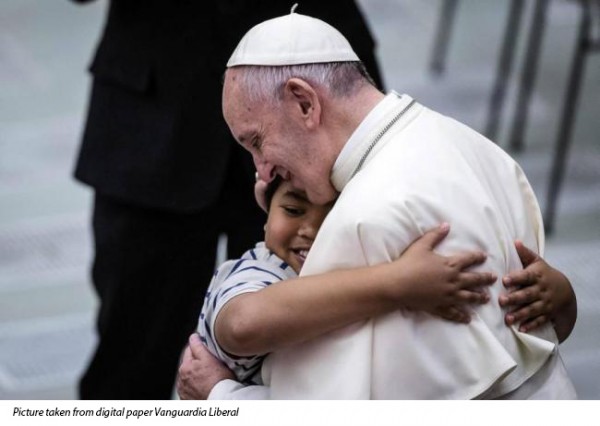
As it was reported by the media throughout the world, from the 6th to the 10th of this month of September, the Pope made his expected apostolic visit to Colombia. It was five very intense days. Intense and exhausting, in the first place, no doubt, for Francis himself, who was in Bogotá, Villavicencio, Medellín and Cartagena presiding at huge gatherings (in each of these cities, those attending the events surpassed all the organizers’ projections), celebrating the Eucharist and having an endless number of meetings: with representatives of the Colombian government, with the youth, with victims of the armed conflict, with religious, with bishops, with people who crowded the streets through which he passed and with those who spontaneously concentrated around of the Apostolic Nunciature of Bogotá, where he stayed. It was also an intense visit for all those who followed it closely: the days were very rich in gestures, in moving moments, in strong messages that deeply touched the country.
Francis had said that he would go to Colombia when the government and the guerrilla would have signed the peace agreement that ends more than 50 years of armed conflict. He has fulfilled his promise, making of his trip an invitation to the reconciliation of all those whom war and violence have confronted for so long.
One reflects now on the pope's visit and realizes that he has left us a universal message: that is, a message that goes beyond the Colombian situation, that transcends it, and that we all can apply to ourselves, whether we are in Colombia or not, if we are concerned about conflicts and violence, if we long for paths to peace and reconciliation. Francis, in his clear and transparent language, has invited us not to be spectators in the construction of peace: “When the victims overcome the understandable temptation of revenge, they become the most credible protagonists of peace-building processes. It is necessary that some are willing to take the first step in this direction” (Homily in Villavicencio, September 8). Again and again, the pope has insisted that we should not resist reconciliation, that we should not be afraid “to ask forgiveness and to offer forgiveness”: “It is time to deactivate all hatred” (Prayer for National Reconciliation, Villavicencio, September 8).
In a world where so many quickly gravitate towards resentment and revenge, and where conflicts, real or imagined, tend to become entrenched, this recommendation (“it is time to deactivate all hatred”) seems essential to us. Essential, in spite of its difficulties. Francis knows how to make his invitation sound as achievable (because it truly is!), the very same invitation that, in somebody else’s mouth, would seem like a fantasy or an empty plea. Deactivate hatred. Forgive. Why not? The gentleness that emanates from the Pope, with his simplicity and lavish smile, enables him to communicate, without offending anyone, a message that in the mouth of another would seem too harsh, and it would most likely be rejected.
A taxi driver from Bogotá expressed this same thought very frankly, and with a certain astonishment, the afternoon of the Sunday when the Pope had finished his visit and had just embarked on his flight to return to Rome. “If someone else told me the things he says, I would not want to hear him. But this old guy has a way of correcting you that makes you pay attention. When I saw on TV that he went into the plane to fly away, I burst into tears.” Francis’ visit to Colombia could not be better summarized.
In a world where so many quickly gravitate towards resentment and revenge, and where conflicts, real or imagined, tend to become entrenched, this recommendation (“it is time to deactivate all hatred”) seems essential to us. Essential, in spite of its difficulties. Francis knows how to make his invitation sound as achievable (because it truly is!), the very same invitation that, in somebody else’s mouth, would seem like a fantasy or an empty plea. Deactivate hatred. Forgive. Why not? The gentleness that emanates from the Pope, with his simplicity and lavish smile, enables him to communicate, without offending anyone, a message that in the mouth of another would seem too harsh, and it would most likely be rejected.
A taxi driver from Bogotá expressed this same thought very frankly, and with a certain astonishment, the afternoon of the Sunday when the Pope had finished his visit and had just embarked on his flight to return to Rome. “If someone else told me the things he says, I would not want to hear him. But this old guy has a way of correcting you that makes you pay attention. When I saw on TV that he went into the plane to fly away, I burst into tears.” Francis’ visit to Colombia could not be better summarized.









